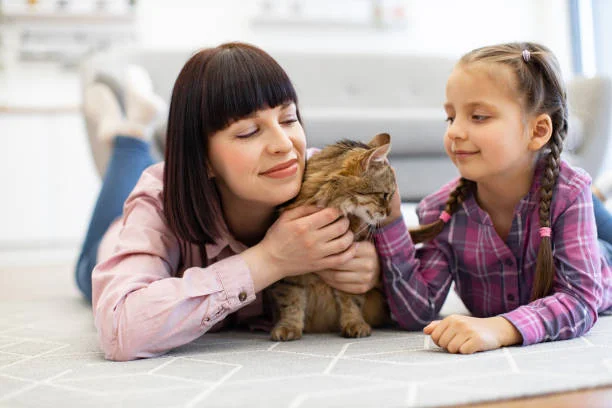Bringing a cat into your home for the first time is an exciting and fulfilling experience. When you’re considering adopting a cat, it’s essential to understand that pet ownership is a long-term commitment that requires responsibility and care Responsible Pet Ownership. As a first-time cat parent, you might be eager to start this new chapter of your life, but it’s important to be aware of the responsibilities that come with it.
With cats being one of the most popular pets, it’s no surprise that people are eager to enjoy the companionship and affection they offer. However, responsible pet ownership involves more than just feeding and petting your feline friend. In this guide, we’ll cover the essential aspects of cat owner responsibilities, ensuring that your new cat has the best start to a happy and healthy life.
Connect the dots — your next favorite topic is in our related post!
Why Responsible Pet Ownership Matters
Being a responsible pet owner means providing a safe, loving environment where your cat can thrive. Cats are independent animals, but they still need love, attention, and proper care. From their diet and exercise needs to regular veterinary visits, responsible ownership ensures your cat lives a long, healthy life.
Responsible ownership is about understanding and meeting your cat’s needs—both physical and emotional. This not only benefits your cat but also contributes to a harmonious and fulfilling relationship between you and your pet.
The Basics of Cat Owner Responsibilities
When it comes to being a responsible pet owner, there are a few key areas that need attention. Here’s a breakdown of the most important responsibilities that you must consider as a first-time cat parent:
1. Providing Proper Nutrition
One of the cat owner responsibilities that cannot be overlooked is ensuring that your cat receives the right kind of food. A balanced diet is essential for your cat’s overall health, and different cats have different dietary needs based on their age, breed, and activity level.
What to Feed Your Cat:
- High-quality cat food: Look for food that contains high-quality protein and essential nutrients. Whether you choose dry, wet, or a mix of both, make sure it meets the specific needs of your cat.
- Avoid human food: While it can be tempting to give your cat table scraps, some human food (like onions, garlic, chocolate, and alcohol) is toxic to cats and should be avoided at all costs.
- Fresh water: Always provide access to clean, fresh water. Cats, especially those on dry food, can be prone to urinary tract issues, so hydration is key.
It’s worth noting that large breeds require a diet rich in protein and fats to support their muscle mass and energy levels. They may also benefit from foods designed to support joint health, as their larger frame can sometimes put stress on their joints.
2. Regular Veterinary Care
Regular check-ups and vaccinations are crucial for your cat’s health. As a responsible pet owner, you should schedule annual vet visits to ensure your cat remains in top condition. Cats can’t communicate when something is wrong, so it’s essential to stay on top of their health through preventive care.
Veterinary Care Checklist:
- Vaccinations: Ensure your cat receives the necessary vaccinations to protect against diseases like rabies, feline leukemia, and distemper.
- Spaying/Neutering: Unless you plan to breed your cat, spaying or neutering is important for preventing unwanted litters and can also contribute to a healthier life.
- Regular check-ups: Annual vet visits are essential for early detection of health issues.
- Flea and parasite control: Regular treatment for fleas, ticks, and worms helps keep your cat comfortable and healthy.
3. Creating a Safe and Stimulating Environment
Cats, particularly active breeds like the Maine Coon cat, need mental and physical stimulation. A safe environment that offers opportunities for play, exploration, and comfort is essential for their well-being.
Creating a Cat-Friendly Home:
- Scratching posts: Cats love to scratch to mark territory, sharpen their claws, and stretch. Invest in scratching posts or pads to protect your furniture.
- Toys and interactive play: Engage in regular play sessions to keep your cat entertained and physically active. Toys that mimic prey, like feather wands or laser pointers, are particularly effective for stimulating a cat’s natural hunting instincts.
- Cat trees and shelves: Cats enjoy climbing and surveying their territory from above. A cat tree or high shelves provide both exercise and a sense of security.
- Safe outdoor access: If possible, provide a safe outdoor space for your cat, such as a catio (a cat patio) or a leash walk. This allows your cat to explore while staying protected.
4. Proper Grooming
While cats are generally good at grooming themselves, responsible pet ownership also involves helping your cat maintain proper hygiene. Grooming your cat can prevent matting, reduce shedding, and strengthen your bond.
Grooming Tips for Cats:
- Brushing: Regular brushing helps reduce shedding and prevents hairballs. Long-haired cats, such as the Maine Coon, require more frequent grooming than short-haired breeds.
- Nail trimming: Regular nail trimming is important to prevent your cat’s claws from becoming too long and painful.
- Dental care: Cats are prone to dental issues, so brushing their teeth regularly or providing dental treats can help maintain their oral health.
5. Training and Behavior Management
Cats are highly intelligent and can be trained, though their motivation to learn may differ from dogs. Responsible pet ownership includes helping your cat develop good habits and addressing any behavioral issues.
Training Tips:
- Litter box training: Make sure you provide a clean, accessible litter box. Cats are naturally inclined to use it, but keeping it clean and in a quiet area will encourage them to use it regularly.
- Stop unwanted behavior: If your cat is scratching furniture or jumping on counters, use positive reinforcement to encourage good behavior while discouraging bad habits.
- Socialization: If you have other pets or children, introducing your cat to them slowly and carefully is important to help them adjust to new members of the family.
Key Responsibilities of a First-Time Cat Parent
| Responsibility | Details | Maine Coon Considerations |
| Nutrition | Provide high-quality, balanced food and fresh water | Larger breeds like Maine Coons need protein-rich diets for muscle support |
| Veterinary Care | Schedule regular check-ups, vaccinations, and flea treatments | Maine Coons may require joint supplements as they age |
| Grooming | Regular brushing, nail trimming, and dental care | Maine Coons have long fur that requires frequent brushing |
| Physical and Mental Stimulation | Provide toys, scratching posts, climbing spaces, and socialization | Maine Coons enjoy interactive play and space to roam |
| Training and Behavior Management | Teach proper litter box habits, stop unwanted behavior, and encourage good habits | Training and socialization are important for a well-behaved Maine Coon |
Becoming a Responsible Cat Parent
Responsible pet ownership is about more than just feeding and playing with your cat. It’s about providing a safe, healthy, and loving environment where your cat can thrive. Whether you’re a first-time cat owner or a seasoned pet parent, understanding cat owner responsibilities will help you provide the best care for your feline companion.
For those considering Maine Coon ownership, it’s important to remember that this majestic breed requires attention to their health, grooming, and activity needs. By staying informed and committed to the responsibilities of cat ownership, you’ll not only create a happy home for your cat but also build a lifelong, rewarding bond.
By investing time, effort, and love into your cat’s care, you’ll be ensuring they live a long, healthy, and fulfilling life—one that’s filled with purrs, playtime, and companionship.
Ready to go further? Explore more and discover hidden gems at Management Works Media!






